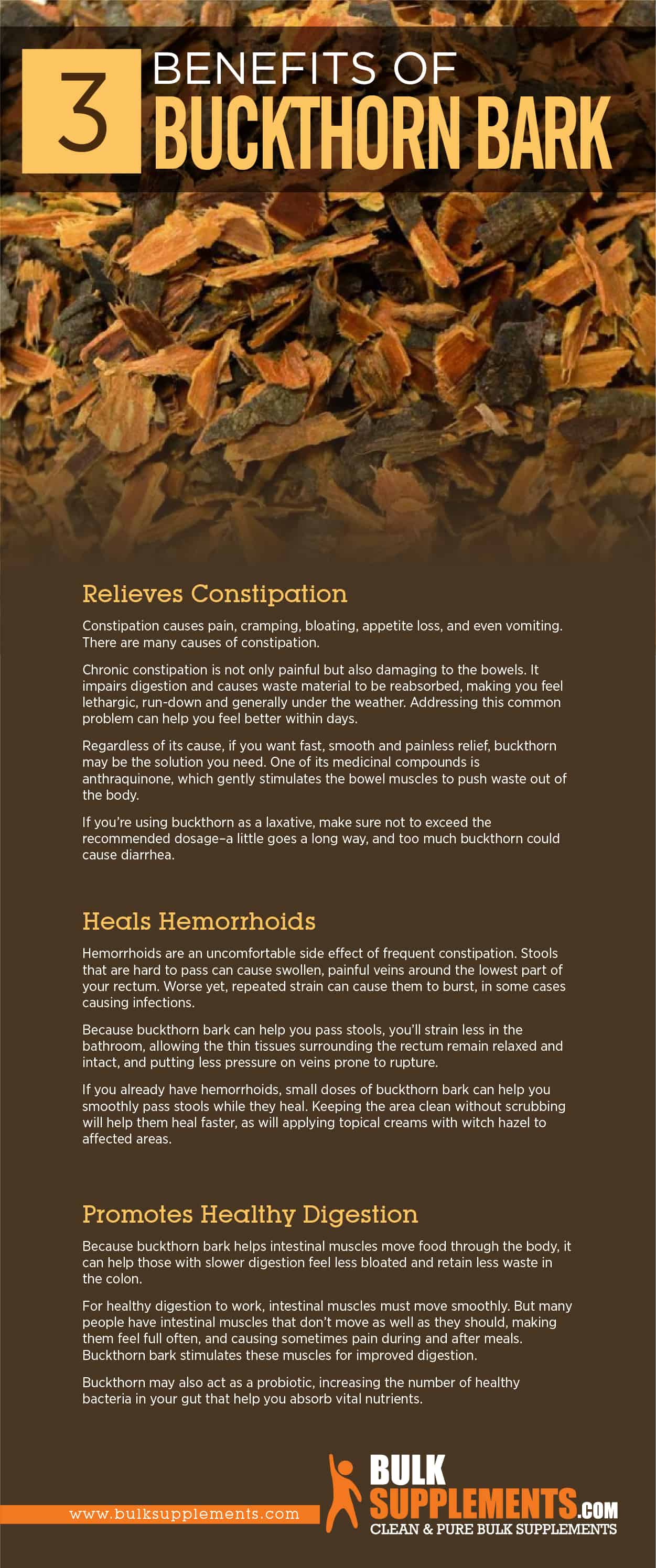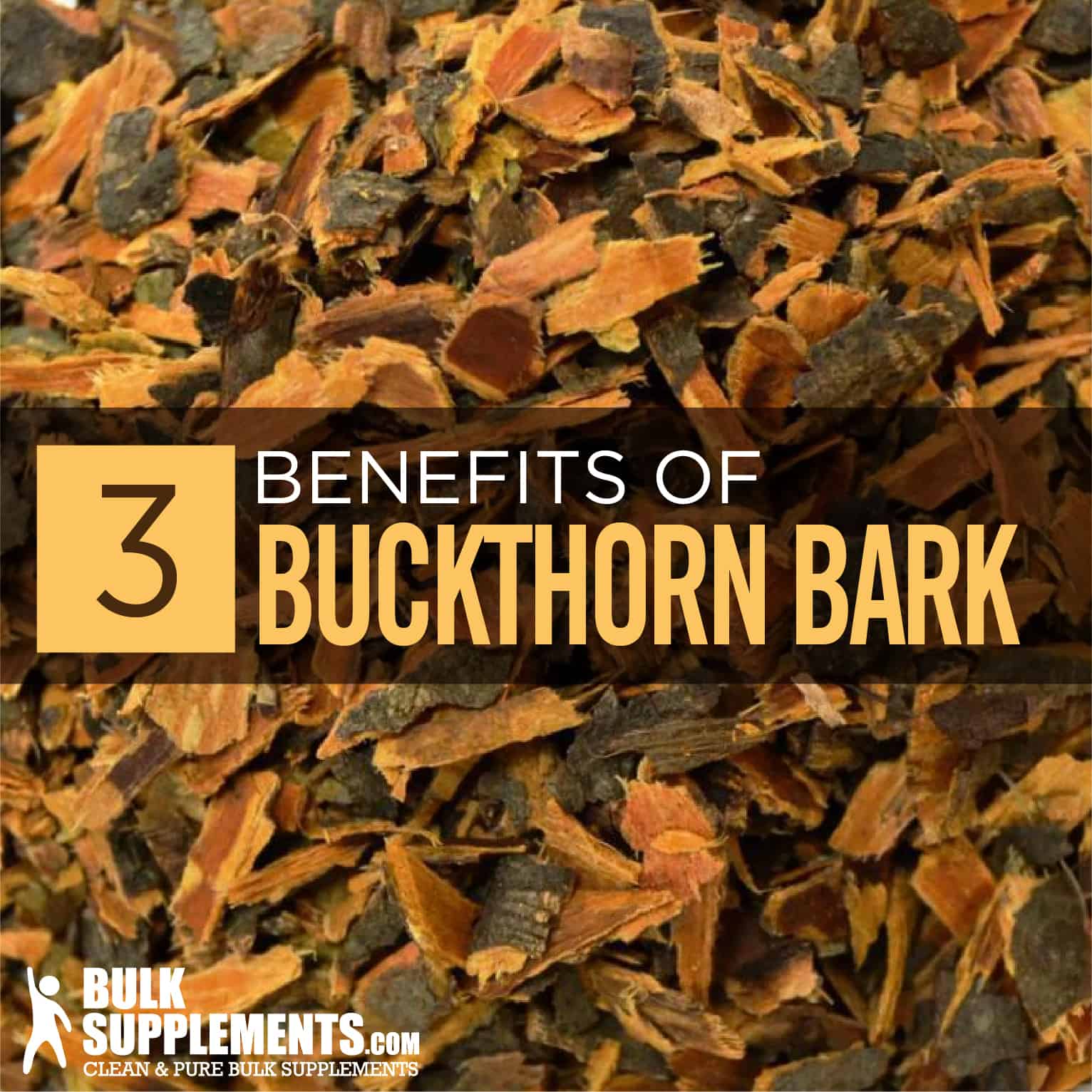What is Buckthorn Bark?
Doctors and other holistic healers have been using buckthorn bark for centuries to ease many digestive complaints, but it’s especially useful to those with constipation. (x) The bark derives from the stem and branches of the alder buckthorn or Rhamnus frangula.
Difference Between Cascara Sagrada and Buckthorn Bark
A similar bark called cascara sagrada from the Rhamnus purshiana or Cascara tree sometimes interchanges when medical experts talk about using buckthorn bark. It is most likely because cascara sagrada uses other names, such as cascara buckthorn, bitter bark, chittem bark, and cascararinde. The plants are different, with cascara sagrada having more medical benefits than the buckthorn bark. Though, cascara sagrada is a traditional medicine used for centuries for health conditions like constipation until the FDA no longer approved it. But you can still buy it as an herbal or supplemental remedy. (x)
Buckthorn Bark is not Sea Buckthorn
Buckthorn bark and sea buckthorn are two different plants, and their names are not interchangeable. Their properties are distinctly different, including additional therapeutic benefits. Sea buckthorn contains vitamins, minerals, and other medicinal properties. You can use its berries, bark, leaves, and seeds to help improve various health concerns, like skin, heart, and liver, far beyond the capability of buckthorn bark.
What is Buckthorn bark?
The buckthorn bark must be a mature plant before consuming it, grown for at least a year to two years, and dried for at least one year before use, as fresh buckthorn bark can induce vomiting. (x) The plant is poisonous to humans, but the bark is safe as long as it’s cured by aging and drying. Otherwise, it acts as an irritant poison. Harvest time is in the summer by stripping the bark from the alder buckthorn branches and trunks. The bark goes through an aging and dehydration process, then prepared into a fine powder.
In the wild, buckthorn flower attracts brimstone butterflies and bees as they feed on the nectar. The round, dark berries attract fruit-eating animals who help disperse the plant through its digestion process. Humans should not eat the berries as they cause severe diarrhea, and sometimes animals overeat the plant and die of dehydration. The scrub needs a lot of light to grow and rarely found in thick forests, but you can see it flourishing along forest edges and open fields. The alder buckthorn grows tall as a deciduous and is native to Africa, Asia, and Europe. It has naturalized in America, such as Canada, Maine, Ohio, New York, Wisconsin, and Michigan, while growing in wet, acidic soil, hedgerows, and open wetland bogs. (x)
Benefits of Buckthorn Bark
Most people take buckthorn extract powder in capsules as they are easier to digest. You might find them in a tablet form, but capsules seem more popular. Either way, talk with your doctor before taking in a new supplement since getting professional advice is helpful and comforting.
The benefits of taking buckthorn powder focuses on the digestive system:
- Relieves Constipation
Constipation causes pain, cramping, bloating, appetite loss, and even vomiting. There are many causes of constipation.
Chronic constipation is not only painful but also damaging to your bowels. It impairs digestion and causes waste material to become reabsorbed, making you feel sluggish, run-down, and under the weather. Addressing this common problem can help you feel better within days.
Regardless of its cause, if you want fast, smooth, and painless relief, buckthorn may be the solution you need. One of its medicinal compounds is the anthraquinone, which gently stimulates the bowel muscles to push waste out of the body. (x)
Anthraquinones have antioxidant and anti-cancer properties. Traditional Chinese medicine has used this component in treating cancer with success, though they used rhubarb as the source of anthraquinones. (x)
The anthraquinone components help increase the colon’s motility (movement) and inhibit spontaneous action development. Such a condition pushes fecal material through the colon, which eventually leads to impaction and constipation.
If you’re using buckthorn as a laxative, make sure not to exceed the recommended dosage–a little goes a long way, and too much buckthorn could cause diarrhea.
- Heals Hemorrhoids and Eases Anal Fissures
Hemorrhoids are an uncomfortable side effect of frequent constipation. Stools hard to pass can cause swollen, painful veins around the lowest part of your rectum. Worse yet, the repeated strain can cause them to burst, sometimes bleeding and causing infections.
Because buckthorn bark can help you pass stools, you’ll strain less in the bathroom, allowing the thin tissues surrounding the rectum to remain relaxed and intact and less pressuring veins prone to rupture.
If you already have hemorrhoids, small doses of buckthorn bark can help you smoothly pass stools while they heal. (x) Keeping the area clean without scrubbing will help them heal faster and apply topical creams with witch hazel to affected areas. Buckthorn may also have antifungal properties, which benefit the colon and help treat hemorrhoids. (x)

3. Promotes Healthy Digestion
Because buckthorn bark helps intestinal muscles move food through the body, it can help those with slower digestion feel less bloated and retain less waste in the colon.
For healthy digestion to work, intestinal muscles must move smoothly. But many people have intestinal muscles that don’t move and they should, making them feel full often and sometimes causing pain during and after meals. Buckthorn bark stimulates these muscles for improved digestion.
Buckthorn Bark Dosage
You can find buckthorn bark available in several supplement forms, including capsules, powders, pills, and tinctures.
You can also take buckthorn bark extract powder, which contains a high concentration of beneficial compounds. As a dietary supplement, take 1,800 mg one to three times daily, or as directed by your physician.
Buckthorn bark has a robust, earthy flavor, which many consider bitter. Those who enjoy intensely flavored drinks can make buckthorn bark into tea, though the powder capsules are more comfortable to take than drinking the tea.
You can also mix the powder into smoothies, juices, and other foods, but be aware that the flavors will change—become more bitter, so try a small amount first.
Where to Buy Buckthorn Bark Extract Powder?
You can purchase buckthorn bark extract powder at BulkSupplements.com. The company is an industry-leading manufacturer and distributor for pure dietary supplements. BulkSupplements.com is not just a consumer brand. It also supplies pure ingredients to other food and supplement brands to make their products. All products at BulkSupplements.com are manufactured and tested according to current and proper manufacturing practices.
Are you interested in trying the natural health supplement? Contact BulkSupplements.com to place an order.
Side Effects of Buckthorn Bark
As long as you adhere to the recommended dosage, buckthorn bark supplements are safe to take for healthy adults. Mild side effects include stomach discomfort, cramps, or diarrhea. As mentioned earlier, don’t take fresh buckthorn bark. Let it age for at least a year and purchase it from a reputable company. Even of the aged herb, excessive use can cause vomiting, so don’t exceed recommended dosages. If you experience any of these side effects, stop taking buckthorn bark, and your symptoms should disappear quickly. Side effects are dose dependent, so consuming smaller amounts is less likely to cause any adverse reactions.
Don’t consume buckthorn bark if you already have cramps, diarrhea, watery stools, or abdominal pain, or if you have pre-existing digestive conditions. Use buckthorn bark only for the occasional discomfort and for only ten days. If you’re currently using digoxin, coumadin, or diuretics, talk to your doctor, as buckthorn bark may interact with these medications.
If you are pregnant or nursing, talk to your doctor about taking the extract powder. There is no evidence that it could harm you or the baby, but take precautions and seek trustworthy medical advice.
The Bottom Line
Buckthorn bark is an herb that has minor side effect used for centuries to treat digestive problems, especially constipation and hemorrhoids. The bark is also beneficial to the colon as it contains anthraquinone, which helps eliminate impacted fecal matter while treating spontaneous bowel movements. Anthraquinone is also an antifungal agent that helps in treating hemorrhoids and includes antioxidants and cancer-fighting properties.
When taking buckthorn bark, be mindful of how much you use. A small dose can go a long way, and a small amount is enough. Too much can lead to an unpleasant experience, such as diarrhea. Overall, buckthorn bark is a valuable herb to use occasionally as a digestive aid. Make sure you talk with your doctor before taking any new supplements.
There are minimal side effects based on taking small doses of buckthorn bark. If you get an adverse reaction, stop taking it, or cut the amount way back. Pregnant or breastfeeding women should consult with their doctor about taking the herb, as there are no reported complications.
The statements in this article have not been evaluated by the Food and Drug Administration. These products are not intended to diagnose, treat, cure, or prevent any disease.


